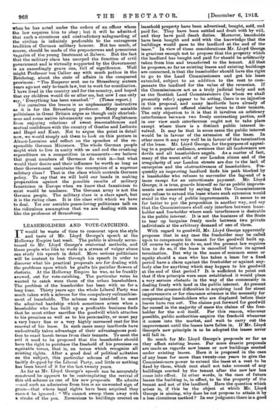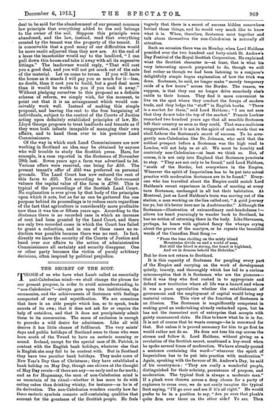LEASEHOLDERS AND VOTE-CATCHING.
IT would be waste of time to comment upon the style and taste of Mr. Lloyd George's speech at the Holloway Empire last week. The public is already accus- tomed to Mr. Lloyd George's oratorical methods, and those people who like to wade in a stream of vulgar abuse can study his speech in detail. More serious politicians will be content to look through his speech in order to discover what his practical proposals are for dealing with the problems upon which be grafts his peCuliar flowers of rhetoric. At the Holloway Empire he was, as he frankly avowed, out for vote-catching. The particular votes he wanted to catch were those of the urban leaseholders. The problem of the leaseholder has been with us for a long time. Thirty years ago the whole Liberal Party was much taken with a scheme for the compulsory enfranchise- ment of leaseholds. The scheme was intended to meet the admitted hardship which sometimes arises when a leaseholder who has built up a profitable business finds that he must either sacrifice the goodwill which attaches to his premises as well as to his personality, or must pay a very beavy fine or a very highly increased rent for the renewal of his lease. In such cases many landlords have undoubtedly taken advantage of their advantageous posi- tion to exact harsh terms from their tenants. To meet the evil it used to be proposed that the leaseholder should have the right to purchase the freehold of his premises on equitable terms, that is, on terms which recognize all existing rights. After a good deal of political aoitation on the subject, this particular scheme of reform was tacitly dropped by the Liberal Party, and little or nothing has been heard of it for the last twenty years.
As far as Mr. Lloyd George's speech can be accurately construed he appears to be contemplating the revival of this old scheme as one of his new proposals. He admits —and such an admission from him is an unwonted sign of grace—that where legal rights have been acquired they cannot be ignored: "We cannot sweep them away with a stroke of the pen. Reversions to buildings erected on
leasehold property have been advertised, bought, sold, and paid for. They have been settled and dealt with by will, and they have paid death duties. Moreover, leaseholds have been bought and sold with the knowledge that the buildings would pass to the landlord at the and of the lease." In view of these considerations Mr. Lloyd George is gracious enough not to propose that the property which the landlord has bought and paid for should be arbitrarily taken from him and transferred to the tenant. All that he proposes, so far as existing leases and existing buildings are concerned, is that the leaseholder should have the right to go to the Laud Commissioners and get his lease extended, subject to an addition to the rent to com- pensate the landlord for the value of the reversion. If the Commissioners act as a truly judicial body and not as the Scottish Land Commissioners (to whom we shall presently refer) appear to be acting, there is no injustice in this proposal, and many laudlords have already of their own accord offered similar terms to their tenants. The only objection to it is that it involves an arbitrary interference between two freely contracting parties, and in our view such interference ought not to take place except where there is a distinct public interest in- volved. It may be that in some cases the public interest would be in favour of the extension of the lease. In other cases it may very well be in favour of the termination of the lease. Mr. Lloyd George, for the purpose of appeal- ing to a popular audience, assumes that all landowners are devils and all leaseholders angels. As a matter of fact, many of the worst evils of our London slums and of the irregularity of our London streets are due to the lack of enterprise and the obstructiveness of leaseholders. Fre- quently an improving landlord finds his path blocked by a leaseholder who refuses to surrender the fag-end of a lease except for an extortionate payment. Mr. Lloyd George, it is true, guards himself so far as public improve- ments are concerned by saying that the Commissioners may refuse to extend the lease where such extension would stand in the way of public improvements. It seems to us far better to put the proposition in another way, and say that the Commissioners shall only interfere between lease- holder and freeholder where such interference is desirable in the public interest. It is not the business of the State to tear up bargains freely made between two private individuals at the arbitrary demand of one of them.
With regard to goodwill, Mr. Lloyd George apparently proposes that in any case the freeholder may be called upon to compensate his tenant for the goodwill built up. Of course lie ought to do so, and the present law requires him to do so, if the lease is cancelled before its agreed termination. But why in the name of common sense or equity should a man who has taken a lease for a fixed period have a claim against the freeholder or against any- body else for anything which may happen to his goodwill at the end of that period ? It is sufficient to point out that if this principle were once established it would place a very serious obstacle in the way of the community in dealing freely with land in the public interest. At present one of the greatest difficulties in acquiring land for street improvements or for clearance schemes is the necessity for compensating leaseholders who are displaced before their leases have run out. The claims put forward for goodwill far exceed in the majority of cases the claims of the free-
holder for the soil itself. For this reason, wherever possible, public authorities acquire the freehold whenever it comes into the market, and wait to carry out the improvement until the leases have fallen in. If Mr. Lloyd George's new principle is to be adopted the leases never will fall in.
So much for Mr. Lloyd George's proposals so far as they affect existing leases. Far more drastic proposals are made as regards new leases or new buildings erected under existing leases. Here it is proposed in the case of any lease for more than twenty-one years to give the Commissioners power to extend the lease at a rent to be fixed by them, which rent shall not take account of any buildings erected by the tenant after the new law has come into effect. In other words, in the case of future leases the building is, in effect, to be the property of the tenant and not of the landlord. Here the question which arises is, if this be the object at which Mr. Lloyd George is aiming, why does he not propose to attain it by a less circuitous method ? In our judgment there is a good deal to be said for the abandonment of our present common law principle that everything added to the soil belongs to the owner of the soil. Suppose this principle were abandoned, and the law, instead, read that everything created by the tenant was the property of the tenant. It is conceivable that a good many of our difficulties would be more easily adjusted than they now are. At the end of a lease the leaseholder would say to the landlord, "I can pull down this house and take it away with all its expensive fittings." The landowner would reply, "That will cost you a good deal, and you will not get much out of the sale of the material. Let us come to terms. If you will leave the house as it stands I will pay you so much for it—less, no doubt, than it cost you to build, but a good deal more than it would be worth to you if you took it away." Without pledging ourselves to this proposal as a definite scheme of reform, we simply wish, for the moment, to point out that it is an arrangement which would con- ceivably work well. Instead of making this simple proposal, and leaving the rest to the free bargaining of individuals, subject to the control of the Courts of Justice acting upon definitely established principles of law, Mr. Lloyd George proposes to treat landlords and tenants as if they were both infants incapable of managing their own affairs, and to hand them over to his precious Land Commissioners.
Of the way in which such Land Commissioners are now working in Scotland an idea may be obtained by anyone who will trouble to study the Scottish press. Here, for example, is a case reported in the Scotsman of November 28th last. Seven years ago a farm was advertised to let. Various offers were received, one being for £50. The present tenant's offer of £45 was preferred on personal grounds. The Land Court has now reduced the rent of this farm to £25. Yet according to the Government valuers the capital value of the farm is £780. This is typical of the proceedings of the Scottish Land Court. No explanation is ever given by that body of the principles upon which it acts, but as far as can be gathered the one purpose behind its proceedings is to reduce rents regardless of the fact that agriculture is considerably more profitable now than it was ten or fifteen years ago. According to the Scotsman there is no recorded case in which an increase of rent had been granted by the Land Court, and there are only two recorded cases in which the Court has failed to grant a reduction, and in one of these cases no re- duction was possible because there was no rent. In fact, directly we leave the security of the Courts of Justice and hand over our affairs to the action of administrative Commissioners all certainty and security disappear. One or other party becomes the victim of purely arbitrary decisions, often inspired by political prejudice.



































































 Previous page
Previous page